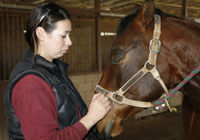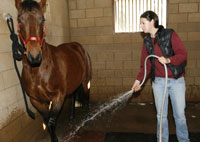Living the country life on campus

Juan Villa / The Collegian
Above: Ashley Day, an agricultural education major, is one of 12 students who live on Fresno State’s campus farm. Day, who lives in a barn, begins her school day before 7 a.m., caring for horses. The work she does on the farm pays for her board and rent. Below: Fresno State students like Ashley Day, who live and work on the campus farm, will have an advantage in the agricultural job market, said Art Parham, chair of the Department of Animal Science and Agricultural Education.

|
By Megan Jacobsen
The Collegian
It’s 7 a.m., an hour before most faculty, staff and students prepare to head to campus for the day but students such as Ashley Day and Dustin Bush, who live at the school farm, are already up feeding and checking animals before they head to class.
“I love agriculture and my family has been involved in the beef industry my entire life,” Bush said. “It was a logical plan to work at the beef unit. It’s what I grew up with.”
Day, a 21-year old from Watts Valley majoring in agriculture education, and Bush, a 24-year-old from San Juan Bautista majoring in agriculture economics, said convenience plays an important factor for the 12 students who live at the school’s animal units. The units are located on Barstow Avenue and across the street from Science II.
On-site at each unit is an apartment-style living facility that includes one or two bedrooms, a kitchen and bathroom. Students who live there are required to work a certain number of hours a month to pay for their board and rent.
“I hate living in the city, but I love walking outside and having the horses right there,” Day said. “I definitely don’t mind living in the barn and since I live on the school farm, it’s not so much living in the city.”
However, convenience and practicality aren’t the only benefits by living there. The educational experiences, along with personal growth, are crucial components.
Art Parham, chair of the Department of Animal Science and Agriculture Education, said the real world experiences and the accountability gained by those students living and working at the units, enhances the desirability of agriculture graduates.
“These students have the skills and habits industry people are after,” Parham said. “These students are the ones who will be hired first, because they have proven their worth.”
Students living at the school farm are involved with day-to-day care and management of all the animals. To be selected to live there is a decision based upon availability and the number of students interested in living there.
“When students like Dustin and Ashley see a production decision made on the farm and then see the professor teach the decision model in class, they can see the model at work in the unit,” Parham said.
“When the professor makes a decision during a lab, student employees are always the first to question the faculty member as to why they did not practice what they preach.”
Located in the top agricultural producing county, the College of Agricultural Sciences and Technology has a long-standing tradition of a quality education, along with producing prominent agricultural leaders. The university farm laboratory, which is a campus-based 1,000-acre commercial scale farm, provides students like Bush and Day laboratory instruction and research opportunities.
“Out here and being in the position I am in, you learn how to lead people,” Day said. “Students come out here with no knowledge or background of the horse industry and it is my job to assist them when they call on me.”
Day said that she, along with other experienced volunteers, help teach classes at the horse unit to give students more of a hands-on understanding.
“For new students, you have to break down everything,” Day said. “Being an agriculture education major, it helps teach me the patience needed when I teach high school agriculture.”
Comment on this story in the Features forum >>
|

